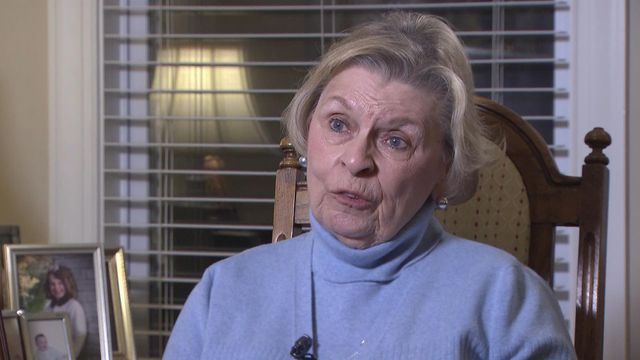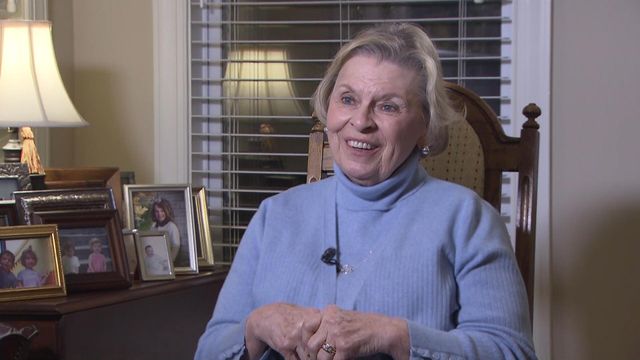Woody Durham's widow now his voice in raising awareness of PPA
A year after the death of the man long known as the voice of the Tar Heels, his wife has found a new mission.
Jean and Woody Durham had been together since they were 16 years old.
"We were married 54 years, 8 months and 11 days," Jean Durham said. "I feel very fortunate to have had such a treasured soul mate for as many years as I did."
She lost the man known for his voice last spring, just before the ACC Tournament. Woody Durham, the beloved Tar Heels play-by-play announcer for 40 years, had PPA, primary progressive aphasia, which takes away the ability to talk and eventually other functions.
"Of course, I talk to him all the time," she said recently. "I know he gets tired of my talking to him."
There are still times when his passing hits his widow in the face, like when she heard his voice at a basketball game earlier this year.
"I don't know why I was not expecting it, but when they did the video with his voice comes through for all the championships, that was, that really did show my vulnerability for a few seconds, but then I thought, you know, that's good too 'cause he's still here," she said.
Since Woody Durham's death, Jean Durham has worked to drive awareness of the disease that took her husband. PPA has no treatment and no cure.
"I feel like anything we can do to help understand what PPA really is, that it's not Alzheimer's, that it doesn't have a drug, it doesn't have a CAT scan that's going to find the pure answer," she said.
University of North Carolina neurologist Dr. Dan Kaufer is one of the few PPA experts in the country, and the doctor who diagnosed Woody Durham, a process that took about five years.
"It's arguably the most important part of our body that's affected here, and we probably have the fewest treatments than any disease," he said.
Kaufer explained:
"Aphasia refers to a primary disturbance of language, and in adults, the most common cause of aphasia is a stroke. In contrast, some neurodegenerative disorders can be present with language problems – and there are several of these. One of the things to distinguish is a stroke, which comes on suddenly and gets better over time, versus a neurodegenerative disease, which comes on slowly and tends to get gradually worse over time. On many occasions, you have to follow people over time to see the changes, and only then do you get a clearer picture of what's going on."
Kaufer credits Woody Durham for putting his face, and voice, to this disease.
Before his death, the Durham family started a T-shirt campaign with Woody's famous saying, "Go Where You Go and Do What You Do." So far, they have raised almost $75,000 for awareness and research for PPA.
It was Kaufer who put Jean Durham in touch with a PPA caretaker support group called The Voice.
"When you look around, there are large support groups for Alzheimer's and Parkinson's, not for PPA," he said. "I took it upon myself to put together a half dozen women, and they've been able to help each other and educate many other people about the highs and lows."
Despite their grief, they take part in conferences to help other caregivers know they're not alone.
At a recent meeting, Kaufer told them, "Woody, I think, is exceptional for having the courage to come out in the public to say, 'This is what I'm dealing with. It's a relatively rare disorder, but this is what it is and I'm going to deal with it the best that I can.'"
"I think Woody has played an amazing role in this whole process," he continued. "The irony of somebody who made a living with his beautiful voice for Tar Heel basketball for 40 years to suffer from this type of disorder – he really gave a face to it and a name to it that people can really identify with."
And there is hope.
"Science is catching up," Kaufer said. "We should have diagnostic tests in the not too distant future to identify this brain disorder."
While Jean Durham continues her work to raise awareness, she finds comfort in her support group.
"It's nice to know you have people who truly understand what your journey has been," she said. "We can sit and talk about things and we all seem to have some of the same problems, but not always the same problems. We know at any given time, we can pick up the phone. We can talk to each other."












